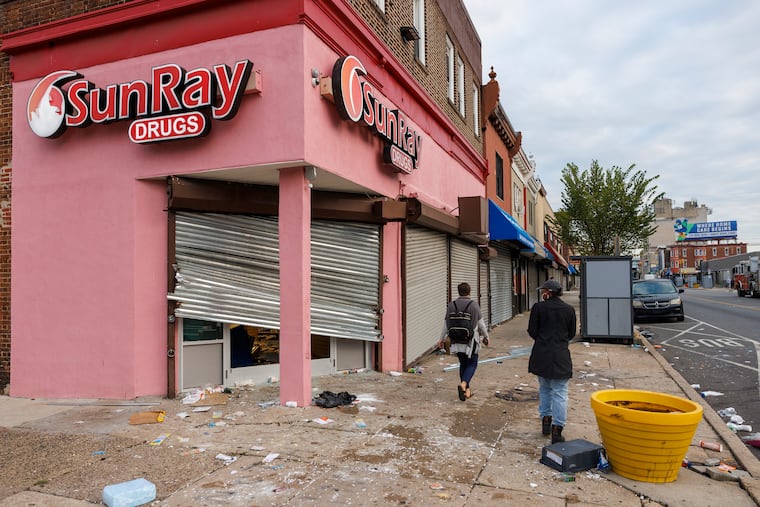A night of looting underscores the need for a balanced approach to public safety in Philadelphia | Editorial
Tuesday's unrest had little to do with a court ruling in the police shooting of Eddie Irizarry, yet both capture the tension between protecting the public and preserving individual civil rights.

The looting that erupted across Philadelphia Tuesday night shows how many people feel free to act out with impunity. Scores of masked individuals, including many juveniles, broke into Center City stores and stole merchandise including iPads from Apple, clothing from Lululemon, and sneakers from Foot Locker.
Smash-and-grabs continued for hours along retail corridors stretching from the Northeast to West Philadelphia. More than 20 people were arrested as police worked to restore order.
It was a baptism by fire for John Stanford, who was appointed acting police commissioner last week by outgoing Mayor Jim Kenney. Hours before the looting began, Stanford also confronted the backlash after a judge dismissed the murder charges against former Police Officer Mark Dial, who shot Eddie Irizarry as he sat in his car with the windows closed following a police stop for driving erratically in Kensington.
» READ MORE: In their plans to reduce crime, a window into the mayoral candidates’ views on public safety | Editorial
Stanford was quick to say the looting was unrelated to the court ruling that set Dial free. That was evident in the peaceful protests that erupted after the judge’s decision — protests that rightly demanded accountability for what police body camera footage shows was a deadly use of force.
Still, some of those who took part in the unrest Tuesday unjustifiably invoked Irizarry’s name as the evening unfolded. One woman shouted, “Rest well, Eddie,” while she livestreamed the vandalization of a liquor store.
If nothing else, the looting and Irizarry’s shooting crystalize the profound tension that exists in our city between protecting both the public and individual civil rights.
The record increase in gun violence and murders has many Philadelphians living in fear. But the rise in retail thefts, burglaries, and stolen cars is emblematic of a broader breakdown that threatens to further chase residents, tourists, and businesses from the city.
Stores like Target and CVS now lock up basic products such as deodorant and diapers behind plexiglass. Several retailers, including Wawa, have closed stores in Philadelphia, citing robberies and safety concerns.
Many point to District Attorney Larry Krasner’s decision to effectively decriminalize shoplifting goods under $500 as sending a message that people are free to take what they want.
In fact, acting Commissioner Stanford described the looters as “criminal opportunists.” He then voiced the frustration of many: “Our city can’t afford this nonsense.”
This is a perilous time for Philadelphia. Many office buildings have sat empty since the pandemic, and the population is dropping. Crime, poverty, and failing schools remain seemingly intractable challenges despite a 50% increase in city spending under Kenney.
The mayor is a lame duck who checked out long ago. The City Council presidency is up for grabs. The district attorney is a former civil rights lawyer who sued dozens of cops and is disliked by them for his soft-on-crime approach. At the last check, Krasner’s office itself was saddled with low morale and personnel churn.
Meanwhile, the city is without a permanent police commissioner until a new mayor arrives in January, and the acting commissioner said his own mother doesn’t feel safe.
The dysfunction and absentee leadership leave residents on edge and feeling like they’re on their own.
» READ MORE: Cherelle Parker ran on a bold crime-fighting plan. Now she must make it work. | Editorial
Cherelle Parker, who is likely to be elected mayor in November, won the Democratic primary with a “tough-on-crime” message that includes the controversial use of stop-and-frisk.
Parker condemned the looting in an interview with The Inquirer on Wednesday, and emphasized the need to “bring some order back to our city.” But it is essential that she restore order without violating civil rights.
In the early 1990s, police used stop-and-frisk to crack down on petty offenses, arguing it prevented more serious crimes. But the practice was found unconstitutional, as police targeted mostly young Black and Hispanic men, who ended up stigmatized and with long arrest records and fines.
In too many cases, the cops killed suspects as routine stops escalated into violent confrontations often captured on cell phone video. The harrowing 2020 Minneapolis police murder of George Floyd, who was accused of paying for cigarettes with a counterfeit $20 bill, led to calls to defund the police as the pendulum swung from tough-on-crime to diversion policies.
Parker must strike a balance. But the city can’t afford to wait for her. Safety — without the abuse of authority — must be restored now.